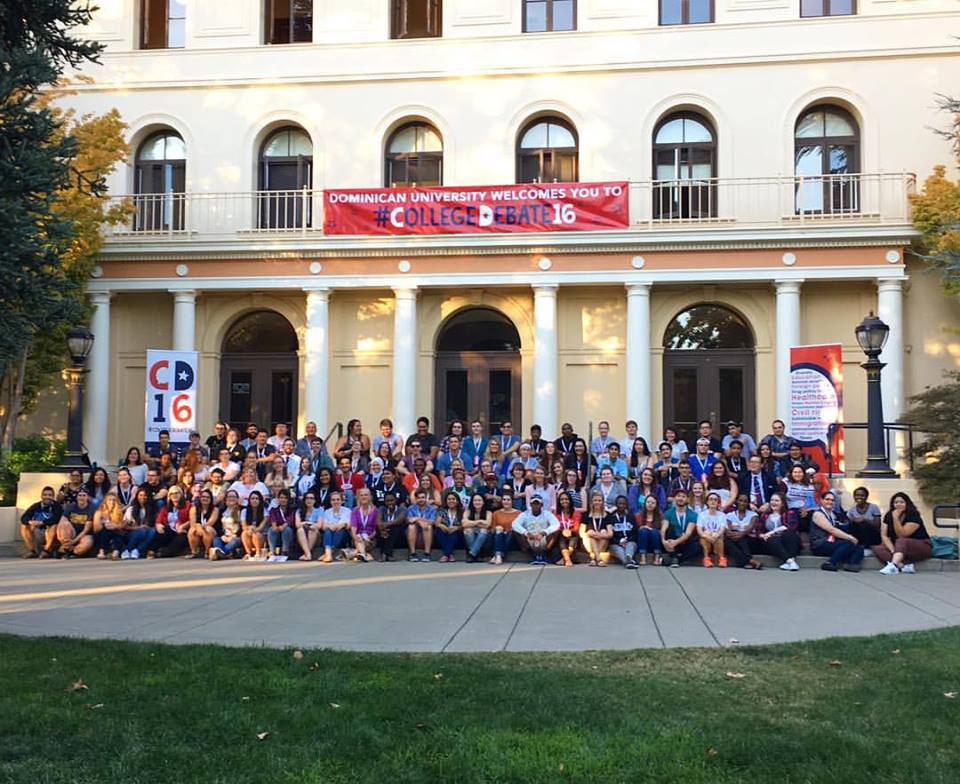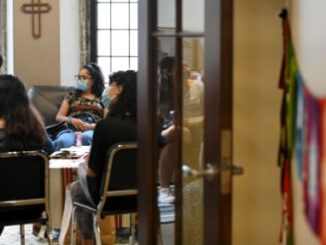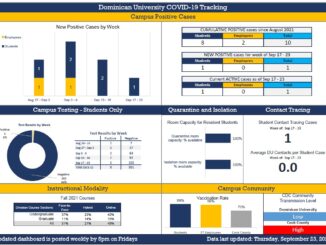
September 20, 2016
By Melissa Rohman
What happens when 150 college students from across the country come together on one campus for two days, incorporating social media and technology, to talk about issues that matter most to millennial voters? Introducing the College Debate 2016 (CD16).
Dominican freshman Joseline Cano, junior Bianca Mena and senior Raunel Urquiza had the opportunity to participate in CD16 hosted at Dominican University of California. The debate aimed to represent millennial voters in this year’s presidential election by posing six questions to presidential candidates Donald Trump and Hillary Clinton in the fall debates at the end of September and October.
CD16 consisted of two all expense paid trips, one to San Francisco this past June to introduce and train CD16 delegates and the other to San Rafael, California in September for CD16.
Cano, Mena and Urquiza heard about the program via email and applied to be Illinois college delegates for the debate. College delegates for each state were chosen based on showing interest in politics and civic engagement.
On Sept. 7, Cano, Mena, Urquiza and the other 150 college delegates from universities and colleges in the U.S. took part in the CD16 town hall meeting, streamed live on ABC 7. Cano and Urquiza were also interviewed by Telemundo. The town hall meeting occurred on Sept. 7 and was moderated by Dr. Sybril Brown, professor of journalism at Belmont University.
One of the two days was designated for discussion panels led by experts discussing issues important to the delegates and the other was for the town hall meeting. Delegates tweeted debate moderators to come up with this list of questions for the candidates:
- How would you restructure governmental assistance programs for the unemployed or impoverished to obtain self-sufficiency?
- What specific circumstances would prompt the United States to use military resources in a foreign country? How would you utilize the nation’s military resources?
- How do you plan on supporting Syrian civilians without creating further conflict with other political actors?
- What will you do to reduce the recidivism and mass incarceration rates in communities where poverty and violence are prevalent?
- What is your plan for aiding the employment of skilled refugees and immigrants in their respective fields?
- How will you ensure quality education to areas of socioeconomic disadvantage both in terms of K-12 and access to higher education?
For Cano, immigration and education are issues of great importance.
“My parents are immigrants and many of the immigration policies being spoken about in this election ties straight into my family,” Cano said. “I am also a university freshman and the tuition rates and loan issues we currently face are detrimental to my current economic situation.”
Mena explains, similarly to Cano, that immigration is the issue that matters most during this upcoming presidential election.
“It’s important because many immigrants are contributing people of society and yet are neglected and exploited due to their citizenship status,” Mena said.
Urquiza agreed stating that he also prioritizes various issues regarding immigration such as: comprehensive immigration reform, protecting current programs like Deferred Action for Childhood Arrivals (DACA) and expanding programs to help families seek legal status in the United States.
A Chicago native, Urquiza explains why he wanted to apply as an Illinois college delegate for the CD16.
“I chose to apply and become a delegate so that I could try to being gentrification to the national stage as an issue for decision makers to act on,” Urquiza said. “I believe that the US Department of Housing and Urban Development is not doing enough and that the answer lies in affordable housing, which our mayor has not acted on.”
One requirement of participating in CD16 is that students take part in a panel for campus freshman in October to both motivate and make them aware that their efforts of bringing TurboVote to Dominican ensures that students are registered to vote. TurboVote is a tool that helps people register to vote, sends voters election reminders via text and helps find polling places.
“As millennials, we are disenchanted from the election process because we feel like we’re not being represented,” Urquiza said. “It’s about how will we empower ourselves to be the ones to set the issues and be the ones to talk about them.”
Cano, Mena and Urquiza believe that millennials are misrepresented in presidential elections and politics in general and that there is a prejudice towards the generation about not caring about the upcoming election.
“Many people are always ready to bash on the millennials saying that we don’t care about the elections nor politics for that matter – CD16 is proving them wrong,” Mena said. “This is us coming together and having civil discourse.”
Cano, Mena and Urquiza learned a lot about regarding civic engagement, social media and politics.
“I really liked how CD16 was able to combine both our ever-growing love for apps like Twitter and Facebook and our interest in politics,” Cano said. “The purpose of this debate is to let presidential candidates, the moderators of the debates, and the United States know that millennials care about this election and that we care about our futures.”
“More than anything I learned how different people from different states views and approach different issues,” Urquiza said. “It’s been interesting for all of us to take into account how we use social media and to use it as a platform. Online activism has it’s good and it’s bad but it usually leads people to take a step further.”
Mena also expressed her enjoyment in meeting college delegates from across the country stating, “I met a few people that were of different political viewpoints than myself and although I might still disagree in their position, I was able to converse with them and step outside my own bubble.”
For more information about the College Debate ‘16, search the hashtag #collegedebate16 on Twitter or visit collegedebate16.org.
melirohm@my.dom.edu



